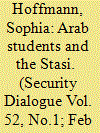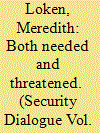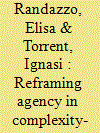|
|
|
Sort Order |
|
|
|
Items / Page
|
|
|
|
|
|
|
| Srl | Item |
| 1 |
ID:
178184


|
|
|
|
|
| Summary/Abstract |
In the early 1980s, the East German Ministry for State Security systematically recruited Arab students as covert informers. Analysis of this historical case contributes to discussions about surveillance as a social practice and to an emerging critical literature about intelligence agencies as knowledge producers and agents of governance. Proceeding from a close reading of archives documenting the recruitment process, I argue that it produced, first, classic modern bureaucratic security mechanisms designed to govern populations and, second, highly specific sovereign interventions into the lives of single individuals. By focusing primarily on the agents of surveillance, rather than its objects, the article addresses an important gap in the surveillance literature.
|
|
|
|
|
|
|
|
|
|
|
|
|
|
|
|
| 2 |
ID:
178182


|
|
|
|
|
| Summary/Abstract |
Because women are assumed to be nonviolent, their participation in militant groups can humanize organizations and legitimize rebellion. But gender beliefs are deeply engrained, and consequently women’s involvement can also generate resistance. This article explores how militants navigate this tension through their political visuals, specifically analyzing images of ‘armed mothers’ across six diverse conflicts. Leveraging life-giving as the ‘natural’ role for women, these images signal violent disruption of everyday life and authorize political violence in response. But they also stress the temporariness of gender-role expansion, promising and preserving a ‘return to normal’. Militant groups contextualize, justify, and humanize violent struggle through these images even in cases where women rarely participate on the front lines.
|
|
|
|
|
|
|
|
|
|
|
|
|
|
|
|
| 3 |
ID:
178185


|
|
|
|
|
| Summary/Abstract |
The article analyzes the Svalbard Global Seed Vault (SGSV) as a specific security technology created to deal with the ecological threat of biodiversity loss. Built in 2008 inside the Arctic Circle, the SGSV serves as a backup for 1,700 agricultural gene banks around the world. If seed collections are lost due to natural disasters or human error, the gene banks can request copies of their varieties from Svalbard and restore their collections to continue the endeavour of plant breeding. The article focuses on the particular temporal politics expressed in the SGSV. Drawing on Niklas Luhmann’s reflections on time, it is argued that the SGSV opens up the possibility of reversing events by expanding the duration of the present. By separating seeds from their ecological connections on the one hand and controlling their metabolic processes through the use of cold on the other, an enduring temporal zone is created that allows modern society to control the unpredictable and irreversible dynamics of life and undo its emergent effects. The SGSV therefore materializes what is herein called the politics of reversibility.
|
|
|
|
|
|
|
|
|
|
|
|
|
|
|
|
| 4 |
ID:
178183


|
|
|
|
|
| Summary/Abstract |
This article argues that feminist technoscience studies can enrich our understanding of biopolitics by challenging the body’s boundaries and focusing on mundane practices of security. To do so, this article looks to Mexicanas/os who cross the US–Mexico border in order to donate plasma in the United States. The article argues that Mexicanas/os are objectified in cross-border donation practices as both desirable sources of life-giving matter and dangerous sources of disease. The article begins by giving some empirical context to plasma donation, before outlining the conceptual contributions of a feminist technoscience studies approach. The article then explores how Mexican bodies are produced as sites of valuable matter which have the ability to make others live. The article shows how the ‘bioavailability’ of Mexicanas/os is produced through colonial and racist histories. Finally, the article turns to the circulation of plasma, demonstrating how persistent fears about Mexican plasma as infectious reproduce highly racializing stereotypes about Mexico and Mexican bodies. The article finishes by reflecting on the importance of a feminist technoscience studies approach for stressing the co-constitutive relationship between race and matter, and that racialized productions of the body at security sites stretch well beyond the body’s skin.
|
|
|
|
|
|
|
|
|
|
|
|
|
|
|
|
| 5 |
ID:
178181


|
|
|
|
|
| Summary/Abstract |
This article examines how the growing complexity of peacebuilding settings is transforming the classic notion of purposeful agency into a non-purposeful, adaptive form of being in such contexts. Through an analysis of critical peacebuilding literature and a reflection on the UN’s peacebuilding practices in the field, the article first argues that complexity has been gradually replacing linear, top-down strategies with approaches seeking to draw attention to interdependencies, relationality and uncertainty. The article then suggests that engaging with complexity has critical implications for the traditional understanding of purposeful agency in the peacebuilding milieu that go beyond those of the governmentality critique, which conceptualizes the complexity turn as a strategy for extending control over post-conflict societies. Complexity is eventually conceived of in the article as a performative contextual quality that stems from the non-linear, co-emergent and unpredictable entanglement of interactions between actors in peacebuilding processes. This state of entanglement hinders the autonomous, purposeful agential condition of these actors in war-torn scenarios – in this article, peacebuilding implementers specifically – in which agency seems more and more restricted to its adaptive nature.
|
|
|
|
|
|
|
|
|
|
|
|
|
|
|
|
|
|
|
|
|